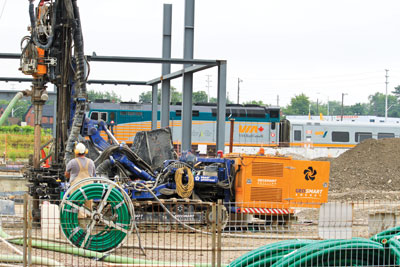
Features
Geothermal
Well, what are you going to do?
Opportunity is knocking for ground water specialists in the geothermal market.
September 12, 2011 By Stan Marco
When geothermal technology first entered the marketplace in southern
Ontario some 30 years ago, ground water specialists embraced it as a
viable way to expand their businesses given the associated demand for
open loop water well systems.
When geothermal technology first entered the marketplace in southern Ontario some 30 years ago, ground water specialists embraced it as a viable way to expand their businesses given the associated demand for open loop water well systems.
 |
|
| Geothermal is a viable expansion option for ground water specialists. Advertisement
|
Open loop geothermal systems in the purest form require two water wells sharing the same aquifer. The supply well often does dual duty, supplying domestic water as well as supply water to the geothermal heat pump. The clean tempered water is then returned unharmed to the same aquifer via the second water well located some distance away on the same property. Given the skill sets of licensed water well specialists, they were quick to recognize the increased business potential.
Not only did geothermal open the doors for new business, but also many ground water specialists invested in the technology themselves as a way to heat their own homes and businesses.
As the Ontario geothermal industry bid for a larger marketplace, it quickly expanded across Canada to Manitoba, followed by Quebec, Nova Scotia, New Brunswick and British Columbia. Newfoundland, Prince Edward Island and Alberta followed a few years later. Florida, Oklahoma and Indiana were quick to further develop the technology and spread it across the United States.
It wasn’t long before North American ingenuity started having an influence on equipment performance, loop design and installation techniques to address everything from dealing with extreme cold temperatures in the north to stifling heat conditions in the south. Today, Canada boasts some of the most efficient and reliable geothermal systems found anywhere in the world.
As installation techniques became more refined, this had a direct impact on ground water specialists. It became apparent that not all properties supported the installation of water wells. It was then that the concept of closed loop systems emerged. In closed loop systems, a continuous geothermal loop is placed in the ground either horizontally or vertically, depending on the expanse of the property. The loop is filled with water which then runs in perpetuity through the loop with both ends connected to the heat pump in the building to absorb the natural heating and cooling properties from the earth.
In a horizontal closed loop, a continuous loop of pipe is buried five to six feet below the ground and requires a significant amount of space. In a vertical closed loop, 900 to 1,200 feet of drilling is required to accommodate twice as much continuously looped HDPE geothermal pipe. As an example, we have learned that the average home may use two vertical loops 455 feet deep or possibly three holes 300 feet deep to satisfy the geothermal need, with deeper holes being more effective than a series of shallower holes.
Closed loops have increasingly gained popularity over the years, particularly in urban areas with smaller land masses. Although more expensive, vertical closed loop systems have become among the most popular means for installing geothermal systems in urban areas. This type of drilling requires specialized expertise given drillers are drilling much deeper holes than those required for water wells, and are doing so in the most cost-effective manner possible.
With the introduction of closed loop systems, a handful of ground water specialists leveraged the opportunity to expand their businesses by learning more about this particular geothermal installation technique. Today they find themselves among a specialized few who have learned about the intricacies of geothermal drilling and whose services are in high demand given the growing popularity of geothermal technology.
The demand is so high, in fact, that specialized geothermal drillers and ground water professionals who have mastered the art of geothermal drilling are finding themselves travelling thousands of miles, in some cases, to fulfil contracts in areas where the geothermal drilling expertise isn’t yet readily available.
At a time when the demand for drilling water wells seems to be on the decline, there is a viable option available for ground water specialists to expand into the geothermal marketplace. Make no mistake: Geothermal drilling does require specialized expertise. However, those willing to take a little bit of geothermal training and invest in some retooling will find a market ready to embrace their talents and expertise.
We are fortunate to have a talented team of ground water specialists across Canada, yet in so many communities across the country, where demand for geothermal installations is on the rise, there is an undeniable shortage of those with the knowledge and expertise to fulfil the drilling requirements for closed loop geothermal installations. As a result, a new industry of geothermal drilling specialists is beginning to burgeon around you, when in fact, you could be fulfilling this need.
Recently, the National Ground Water Association (NGWA) in the United States has embraced geothermal drilling proposals as an extension of what it does, and as a result, ground water specialists are finding new and exciting ways to leverage their skills and expertise. As the marketplace becomes increasingly competitive, and the demand for geothermal drilling expertise continues to rise, the time is ripe for you to rethink their business plans and consider an expansion into geothermal drilling as a way to ensure long-term business sustainability.
Stan Marco is a well-respected geothermal knowledge expert and educator. He is an active member of the ground water community, a board member with the Canadian GeoExchange Coalition and a co-founder and CEO of GeoSmart Energy & GeoSmart Drilling Services.
Print this page